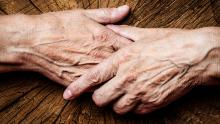Mirror image proteins could hold the key to new Parkinson’s treatments

The steady and debilitating progression of Parkinson’s is thought to be driven by the gradual accumulation of misfolded proteins in the brain. The EU-funded SYN-CHARGE project made the surprising discovery that these problem proteins may be targeted by peptide chains made from mirror image amino acids. The work lays the foundation for potential new therapies for several neurodegenerative diseases.









